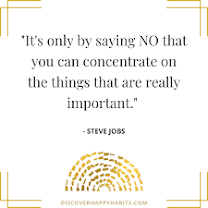It's OK To Say "NO"!
The Oxford English Dictionary tells us that there are around 170,000 English words in current use while there are an additional 47,000 obsolete words to date. Before we get embroiled as to WHY It's OK To Say "NO", let's spend time to dissect as to WHY WE SAY YES [more often than NOT]. At the top of my list, I believe this is very cultural in nature. Like Asians, generally, they would struggle to say NO, instead ending up to say YES [when, all along, they really want to stamp down their foot and say NO]. That explains why foreign investors are very Asian-centric because by and large, Asians struggle to say NO. On the other hand, in general terms, westerners will say NO if and when they need to say NO. That's without even batting an eyelash📗📙📘
Besides that cultural aspect, part of that can explained by the nature of Asians wanting to avoid confrontation and add to that, that 'PLEASING OTHERS' mindset all rolled into one. I would admit that a few times in the past, I did say YES when our American CFO invited me to the the CNY [Chinese New Year] dinner he hosted for our American-Chinese guests. In short, most of us do this to a lesser extent , because people generally want to help the interest of others. Things get a bit tricky if we tend to manifest that FEAR OF MISSING OUT [FOMO]. And FOMO is a very real thing and WHEN we feel as if saying NO will prevent us from experiencing something we perceive others will, saying YES feels like the only natural option [good grief]💦💦💦
And the most frequent 'wild card' that seems to throw a monkey wrench in our decision-making process is our COMPULSIVITY, that situation WHERE we feel naturally compelled to 'overdo it' and say YES to any situation out of a compulsive nature. On the other hand, the power of saying NO really comes down to the effects it has on our brain. WHEN we say NO more often, we shift the way our brain thinks and reacts to situations, allowing us more ability to make decisions for ourselves. BUT experts tell us this will have a tremendous effect on our mental health as it allows us to value ourselves much more✅✅✅
Bottomline, it allows us to SET BOUNDARIES. And since BOUNDARIES in mental health treatment are typically that critical, saying NO allows us to develop the necessary skills and tips for SETTING BOUNDARIES ahead of time. It's true that even if we deem to enforce these thought processes into our mindsets, we will still find ourselves in numerous situations WHERE saying YES is the better decision. So, HOW do we know exactly WHEN to say NO???
To quote the revered late Steve Jobs, "IT'S ONLY BY SAYING NO THAT YOU CAN CONCENTRATE ON THE THINGS THAT ARE REALLY IMPORTANT". Before we get to our takeaway, HOW do we know that saying NO is eitherq right OR wrong? WHEN we learn to say NO, we must ask ourselves certain questions about the situation. WILL saying YES prevent us from focusing on something that's more important? WILL saying YES make us even more tired OR burnt out? These questions will give us the framework for WHEN it's finally time to say NO. Otherwise, this is a judgment call WHERE our the interplay of our decision-making skills will surface. Oh YES, it's ok to say NO❗❗❗
















No comments:
Post a Comment